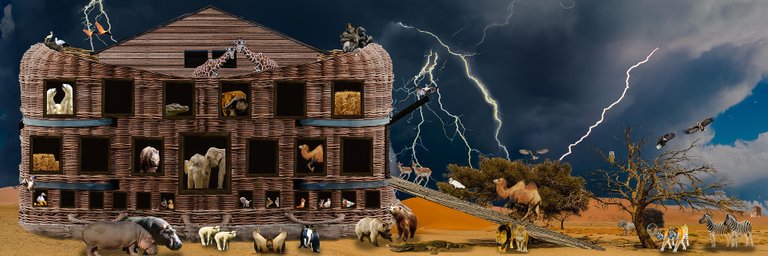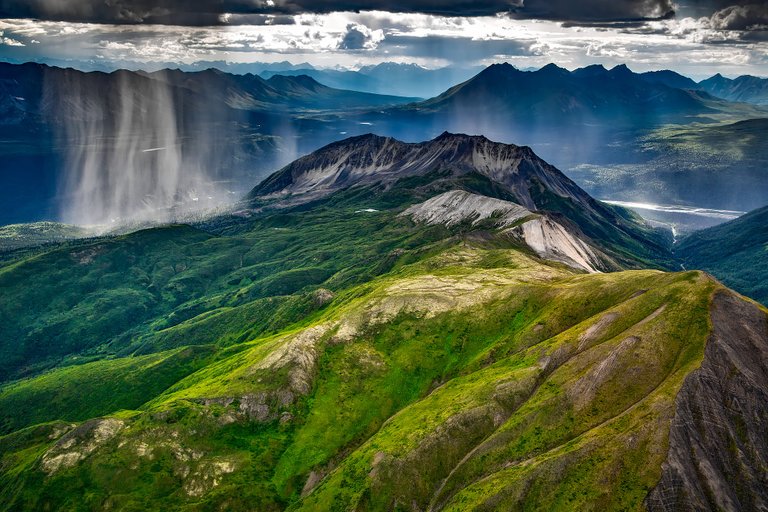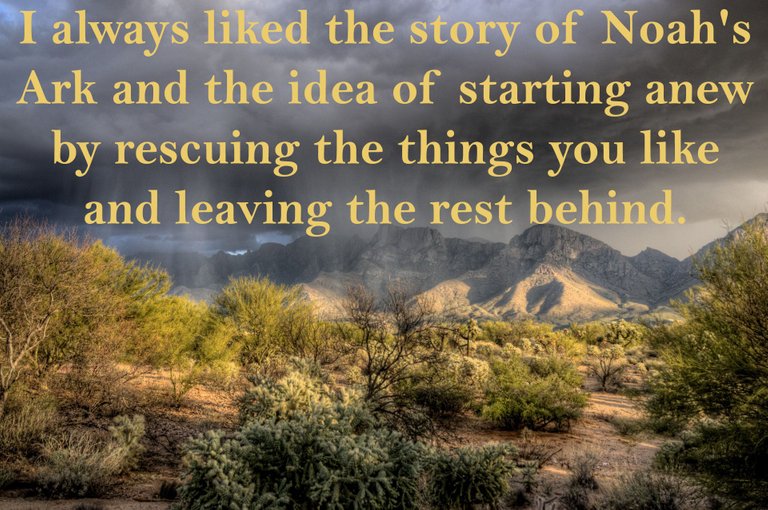I do not claim that there has never been a flood that left a strong impression on the residents of the area who later preserved his memory and passed it on to their children.
But perhaps what they told us as children, It is only one version of many kinds of the flood story. We grow up in a particular environment, with a certain perception of life and usually, what we see and hear at home, this is what we will take with us for the rest of our lives.
As an adult, I am always looking for explanations for what was not clear to me in the Bible stories. It is not easy to find stories that are not from the Book of the Bible, but happened simultaneously. I managed to find stories parallel to Noah's flood story. Many different cultures tell a very similar story to Noah's flood story.

The Story of Noah's Ark and the Flood is one of the greatest dramas mankind has ever known. Mass extermination and calculated rescue ignited the imagination of writers, poets and intellectuals, and turned the story of the flood and his hero Noah, one of the most mythological stories told mankind throughout the generations.
In many books, flood stories from the Mesopotamian region have been documented, including stories are written in about stone and papyri.
The documents that survived and documented indicate that in most of the stories the dove appears as the harbinger of the end of the flood and an olive leaf rises in her mouth.
For over a century, the Flood has been the object of scientific research. Scientific publications around him also include research by the best scientists in the world, including chronological, geological, oceanological, zoological, archaeological, and theological studies.
Generations of researchers sought to answer the question of the source of the abundance of water. Some researchers claimed that the water was the result of underground volcanic movements, and others thought that gas covered the earth's surface and became water droplets. According to this theory, which is now more pictorial than science, the gas blocked ultraviolet radiation, causing Noah to live 900 years. Today, researchers tend to speculate that most of the water came from the glacial mass. They also quoted from the Bible about the flow from above and below.
Faith and Science - with the discovery of the ruins of Nineveh, it became clear that the peoples who lived in that ancient period passed from generation to generation major events from human history up to their time, with the disruptions characteristic of stories passed down from generation to generation among nations who are not committed in any way to preserve their tradition as written

It should be noted that similar evidence of the flood exists in most of the ancient cultures, from several changes that were made during the transmission of information from generation to generation as should occur naturally traditions do not have the prohibition, not to add or subtract or change anything in the biblical narrative transmitted from generation to generation.
This story appears among many peoples all over the world. In different languages and in very different cultures: Greece, Ireland, Germany, Mayans, Incas, Hopi, Aztecs, China, Indonesia, Polynesia, Persia and more.
Mexico, North America:
The Aztecs (Aztec) who were in America, also believed in the stories of a great flood. According to their belief, after the "age of the sun" [8] all human beings drowned. The water and the sky touched each other, and in one day everything was lost, and even "the mountains drowned in the flood." Only one family survived, after God warned one man named "Nota" from the flood, and put them in a safe place until the flood stopped. From: Ancient Aztec document Codex Chimalpopoca, translated by Abbe Charles Etienne) Brasseur de Bourbourg
Peru, South America:
The Incas. According to the legends of the Incas, God killed all the giants in a great flood, and only two people who were saved reoccupied the world (from Inca mythology, Unu Pachakuti).
Central / Middle America (south of North America):
The Maya were indigenous Native American groups. According to their belief, "Huracan, one-legged" caused a global flood of the resin after humans sinned. Only four people and four women survived and they populated the world again.
Northeast Arizona (Southwest United States):
The Hopi mythology were early Native American (Native American) Indians. According to their faith, men tried to escape from God who sought to destroy the world through fire and ice. Only the people who obeyed the laws of creation were saved. But they, too, were finally corrupt. According to legend, God decides to finally bring a flood to the whole world, and only a select group of people were saved from the flood by giant reeds floating on the water.
South-East America:
The Caddo mythology was Native Americans (Indians) from South America. According to their belief, a world-wide flood destroyed life. Only one family survived the floo after one of them heard a "voice" telling him to build a "hollow reed" that had grown into a huge ship. The man entered the ship with his family and brought in couples from all kinds of "good" animals. Then the flood covered the whole world, including the mighty monsters. Finally, the water receded and the wind dried the land.
Mi'kmaq, North-East New England and Canada in America:
The Mi'kmaq were native Americans (Indians). In the mythology of the Mi'kmaq mythology, it is said that hatred led people to fight each other, which caused the great god to cry. This crying began as rain and eventually turned into a great flood. Humans tried to survive, but all were extinct except for a man and a woman who later occupied the world.
Ireland, Europe (west of Britain):
The Early Irish, according to the Irish legends (Irish mythology: Lebor Gabála Érenn), the Irish believed that the first settlers in Ireland were descendents of Noach (the great granddaughter of Noach, Cessair) who survived after everyone was washed away in a flood that lasted 40 days.
Germany, Europe:
The ancient Germans, in the Norse mythology describe gigantic gods fighting until one of them is wounded, and his leaking blood brings a flood over the world. This flood destroys all of life, except for two people who survived by ship.
Persia / Iran, Asia Continent:
The ancient Persians (Persian mythology), told a story similar to the flood, but the destruction of the world was done to them through great frost. Only one man named Jamsheed was warned by God, and was saved in an underground cave with his family and all the animals he had gathered for him. Then they populate the world again.
Apamea, the central west of Asia Minor (now west of Turkey):
On the official coins of the ancient Frigis (the beginning of the second century CE), there was a box with a man and a woman sitting in it, this box sailing on the surface with a bird on it. Towards the flying bird box that holds a branch. Outside the box a man and a woman are seen reaching for the sky.
Greece, Continent Europe (South-East Europe):
The ancient Greeks, believed in three great flood types in the dawn of mankind (flood of Ogyges, flood of Deucalion and the flood of Dardanus). One of the stories of the Flood (Deucalion by Apollodorus) describes how God decides to destroy the entire world in a flood. Dauclion survived with his wife after he built a box, and the rest of the people perished in the flood. After the Flood, the survivors sacrifice and renew humanity. The ancient version of the legend also tells how the Ark landed in the mountains after the flood. Plato had already noticed in his days the many flood stories, and concluded that there was a flood in the ancient past, from which only individuals were saved.
The continent of Australia - Oceania, is located southeast of the Asian continent
The Australians, believed that in the distant past "giant frog" swallowed all the water in the world, and when it was made to laugh, it spit all the water that caused a great flood and extinction, until "the tops of the high mountains looked like islands in the sea."
Islands between India and Indonesia, belongs to India:
The Andaman Islands, have traditions of a world flood. According to the tradition of the tribes living on the islands, people did not follow the laws given to them at the time of creation, and for this reason, all beings were wiped out in a world-wide flood. Only one family was saved by flood, and God returned to create the animals after the flood
India, Asia:
The Indians, also believed in a tradition of flood, which, according to scholars, is even more ancient than the Sumerian tradition. In their stories (Matsya Purana, Satapatha Brahmana) the ancient ruler also known as "Manu" found a fish in the river, which revealed to him that there was going to be a world flood that would destroy all life. So "Mano" builds a huge ship with animals of all kinds ("seeds of life"), so that they will populate the planet again after the flood.
China, and Southeast Asia:
The Chinese, held similar traditions on a huge flood and floods. The "History Book" (Shujing), dating at least 700 years before the Christian era, tells of Emperor Yao, who is facing a flood problem that "reaches heaven" until he is arrested. It is interesting that the dating of the "flood" described in this tradition is identical to that of the biblical flood (Shu king: history of China, B.C. 2355 to B.C. 719).
In another Chinese tradition called "The tradition of the mountains and the days" (Chapter 18, Shanhaijing), it is told about ten-year-old ruler Da Yu in an attempt to deal with a floodwaters overflowed [to] heaven " . In fact, countless ancient Chinese traditions (Shiji, Chuci, Liezi, Huainanzi, Shuowen Jiezi, Siku Quanshu, Songsi Dashu) refer to a figure named Nuwa (sometimes also as a female figure)! Which corrects the sky after the great flood or the "terrible disaster", from which human beings multiply all over the world. There are countless Chinese versions of this story.
Iraq / Babylon, controlled large areas in the Fertile Crescent, on the Asian continent:
The Babylonians, believed in a similar story, which is included in the Gilgamesh plots. It also mentions a great flood created by "the wrath of the gods" (Table 11), but one of the gods warns Gilgamesh against the Flood, and he builds a mighty box into which he brings his family and various animals.
Mesopotamia/ Assyria, is located in northern Syria near the Turkish border:
The Sumerians believed that the gods were angry with humans and decided to bring a flood to the entire human race, except for one man named Ziusudra (Atrahasis) who was saved from the flood after he built a giant ark directed by one of the Enki gods. After the flood Zeusudra sacrifices to the gods.
To summarize: the fact that different cultures are different from each other and that the oceans distinguish between them, tell the same stories about the flood that hit the world. They do not report a flood from which he was saved with any tribe or tribe, but rather a flood that destroyed all humanity in the world. And almost all of them, even those in the Americas far from the Middle East (where the Black Sea is located) tell of: a global flood that destroyed all human beings and animals in the world, one person warned of the approaching flood, the entry of couples from all animals into the ark, all the people living in the world today are descended from the same family. This story, although found in very different variations, still reports many identical details. Local floods can not explain the stories of a world-wide flood, told all over the world.
I have to assume that the only reasonable possibility is that the biblical description of the flood is baseless, and in any case it can not be written by some serious god. According to Genesis, they are pure human creation and like all other human creations of the Bronze Age it also suffers from shaky cosmology, Hallucinations and primitive myths.

Who wrote a wonderful post on Genesis , That you must read.
There are posts that take me to amazing places. Explore and try to find answers to religiosity or philosophical questions that are not fully understood (to me).The idea for this article was taken after reading the amazing post of a good friend @techslut
Images via Pixabay.com
Quote via brainyquote.com Zach Braff


Noah's ark is the one bible story that pretty much Every person in the free world has a working knowledge of. Assuming you haven't embellished any facts, this article presents profound evidence that the event described in that story really did happen. Then you conclude that the biblical description of said event is "baseless"
I am guessing that English is not your mother tongue, so believe me when I say I'm not a troll. I would ask you to please elaborate on your summary and conclusion a bit more so I can understand where you're coming from.
You say that the Genesis flood story "...suffers from shaky cosmology, Hallucinations and primitive myths," and therefore could not be written by "some serious god."
First of all, no one who believes in the bible thinks that God wrote it. The bible is believed to be inspired by God, yet written from the perspective of men. Also, without typewriters, computers, or any modern scientific knowledge, these writers used common literary devises such as Metaphor, hyperbole, and poetic license to explain complex themes in a way that got the point across, and that people living 3000 years ago could understand. This is precisely why the cosmology is "shaky." Can you imagine just laying it on the ancient commoner how vast the universe is, and that their whole wide world is about the size of a speck of dust on a grain of sand on that scale? It would cause mass panic! The elders would have heart attacks!
Also, the mythology is not primitive. It is portrayed primitively since the authors along with the intended audience were primitive people! The substance of the text is just as relative today as it was over three thousand years ago. That's the opposite of primitive.
In the first chapters of Genesis, God, Just like any good parent would, reveals to us the pith of existence on a level everyone can understand, then leaves it up to us to figure out the details. The two main tools we use to aid us in this task are science and philosophy. In other words, to dismiss the bible because it lacks scientific accuracy is to miss the point completely.
I'm writing this because I care about my fellow man, and believe in skepticism. Being skeptical is what helps protect us from deception. On the other hand, if one's skeptical stance is rooted in an incomplete or false understanding of the thing in question, skepticism could be mistaken for ignorance. I wouldn't want that for myself, and I try to help others when I can.
Thank you very much for the reply to the post,
Everything is fine, every person chooses his way of life.
As long as she does not harm another person - that's excellent
img credz: pixabay.com
Nice, you got a 92.0% @investegg upgoat, thanks to @nirgf
It consists of $0.97 vote and $0.06 curation
Want a boost? Minnowbooster's got your back!
To call @OriginalWorks, simply reply to any post with @originalworks or !originalworks in your message!
@minnowpond has voted on behalf of @minnowpond. If you would like to recieve upvotes from minnowponds team on all your posts, simply FOLLOW @minnowpond.
To receive an upvote send 0.25 SBD to @minnowpond with your posts url as the memo To receive an reSteem send 0.75 SBD to @minnowpond with your posts url as the memo To receive an upvote and a reSteem send 1.00SBD to @minnowpond with your posts url as the memoThank you for Using #promo-steem tag, Promote steemit by inviting your friends and your family!